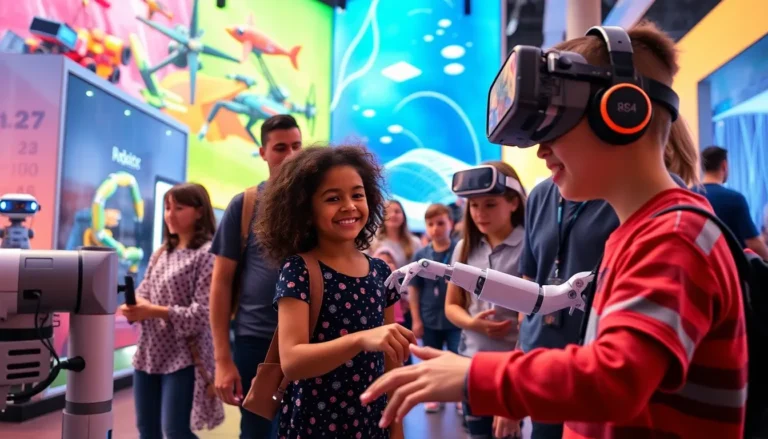In a world where smartphones are practically appendages and AI is starting to sound like a helpful roommate, innovation and tech are rewriting the rules faster than you can say “Wi-Fi.” Every day, new gadgets and breakthroughs pop up, making life easier, funnier, and occasionally more confusing. Remember when a flip phone was cutting-edge? Now, it feels like a relic from the Stone Age.
Today’s tech landscape isn’t just about shiny devices; it’s a playground for creativity and problem-solving. From smart homes that can brew your coffee to virtual reality experiences that whisk you away to fantastical worlds, innovation is the name of the game. Buckle up as we explore how today’s advancements are not just changing the way we live but also tickling our funny bones along the way.
Innovation and Tech Today
The landscape of technology and innovation continues to transform rapidly. New advancements reshape everyday experiences, significantly impacting personal and professional lives.
Historical Context
Technology has evolved through distinct phases, starting with mechanical inventions that laid the groundwork for today’s digital innovations. The 20th century marked the advent of computers, laying a robust foundation for future developments. Personal computers emerged in the 1980s, making information accessible to the masses. The introduction of the internet in the 1990s connected individuals worldwide, revolutionizing communication. Each of these pivotal moments set the stage for the advanced technologies seen today, including smartphones and smart devices.
Major Milestones
Major milestones in technology include breakthroughs that have significantly influenced society. In 2007, the launch of the first iPhone redefined mobile technology and user interaction, emphasizing touchscreen interfaces. The rise of cloud computing in the early 2010s allowed businesses to store and analyze massive amounts of data efficiently. AI gained traction during this period, leading to advancements in machine learning and automation. Virtual reality also emerged as a transformative force in gaming and retail, enhancing user engagement. Each milestone has played a crucial role in the ongoing evolution of technology and innovation.
Key Trends Shaping Innovation and Tech Today

Various trends are currently influencing technology and innovation. Significant developments include Artificial Intelligence, the Internet of Things, and Blockchain technology.
Artificial Intelligence and Machine Learning
Artificial Intelligence drastically changes how businesses operate. Machine Learning algorithms enable data analysis and predictive analytics, which enhance decision-making processes. Companies leverage these technologies to automate tasks and improve operational efficiency. Leading organizations utilize AI-driven customer service chatbots, which provide instant support. Advanced applications in healthcare demonstrate precise diagnostics and personalized treatment plans. As AI continues to evolve, it reshapes industries and drives innovative solutions.
Internet of Things (IoT)
The Internet of Things connects everyday devices to the internet, creating smarter environments. Smart home systems enable users to control appliances remotely, enhancing convenience and energy efficiency. In manufacturing, IoT solutions optimize supply chains, monitor machinery, and improve productivity. Wearable devices track health metrics, promoting wellness and fitness. Security industries also benefit, utilizing IoT for enhanced monitoring. Implementations of IoT not only transform personal lives but also revolutionize operational frameworks across sectors.
Blockchain Technology
Blockchain technology revolutionizes data management through decentralization. Secure and transparent transactions characterize this dynamic, aiding industries like finance and supply chains. Companies adopt Blockchain to enhance transparency in contractual agreements and reduce fraud risks. Cryptocurrency markets thrive on Blockchain, enabling peer-to-peer transactions sans intermediaries. Additionally, smart contracts automate processes, ensuring compliance and efficiency. As Blockchain technology amasses traction, its potential applications expand, fostering innovation across diverse fields.
The Impact of Innovation on Society
Innovation significantly influences various aspects of society. Rapid advancements in technology drive economic growth and alter daily living.
Economic Growth
Economic growth thrives on innovation and technological advancements. New industries emerge, creating job opportunities and increasing productivity. In 2020, technology sectors contributed approximately $1.8 trillion to the US economy, reflecting substantial growth. Startups frequently drive innovation, leading to increased competition and improved services. Moreover, established companies leverage automation and AI to streamline operations, which enhances efficiency. As a result, consumers benefit from lower prices and better quality products, ultimately boosting overall economic health.
Changes in Daily Life
Changes in daily life result from continuous technological advancements. Smart devices enhance convenience, allowing individuals to control home environments effortlessly. For instance, smart thermostats optimize energy usage, leading to lower bills. Communication has evolved too, with instant messaging and video calls fostering global connections. In 2021, 83 percent of Americans used video conferencing tools, underlining this shift. Additionally, telehealth services have transformed healthcare access, enabling remote consultations. Overall, technology not only enriches lifestyle experiences but also fosters a sense of community.
Challenges Facing Innovation and Tech Today
Innovation and technology face significant challenges that can impede progress in various sectors. These challenges include ethical considerations and data privacy concerns, which have gained prominence in recent years.
Ethical Considerations
Ethical considerations frequently arise as technology rapidly advances. Innovators must consider the moral implications of artificial intelligence and automation. Code that governs AI can inadvertently exhibit biases that affect marginalized groups. Developers play a crucial role in addressing these biases and ensuring equitable outcomes. Furthermore, discussions surrounding the use of technology in surveillance prompt public debate about personal freedoms versus security. Successfully navigating these ethical dilemmas requires transparency and accountability from tech companies.
Data Privacy Concerns
Data privacy concerns continue to escalate as technology becomes more integrated into daily life. Consumers increasingly worry about how personal information is collected and used by companies. Breaches are reported frequently, resulting in significant losses of consumer trust. Regulatory measures, such as the General Data Protection Regulation (GDPR), aim to enhance privacy protections. Despite these measures, many organizations struggle to comply fully, exposing vulnerabilities. Prioritizing robust privacy protocols becomes essential for protecting user data in an evolving digital landscape.
Conclusion
Innovation and technology are reshaping the world in unprecedented ways. As advancements continue to accelerate, they bring both opportunities and challenges. The integration of AI IoT and Blockchain is not just enhancing convenience but also redefining industries and creating new ones.
While these technologies drive economic growth and improve daily living, they also necessitate a careful approach to ethical considerations and data privacy. Addressing these issues is essential for ensuring that innovation serves everyone equitably.
The journey of technology is far from over. As society embraces these changes, the potential for creativity and problem-solving remains limitless. The future holds exciting possibilities that will undoubtedly transform lives and industries alike.




